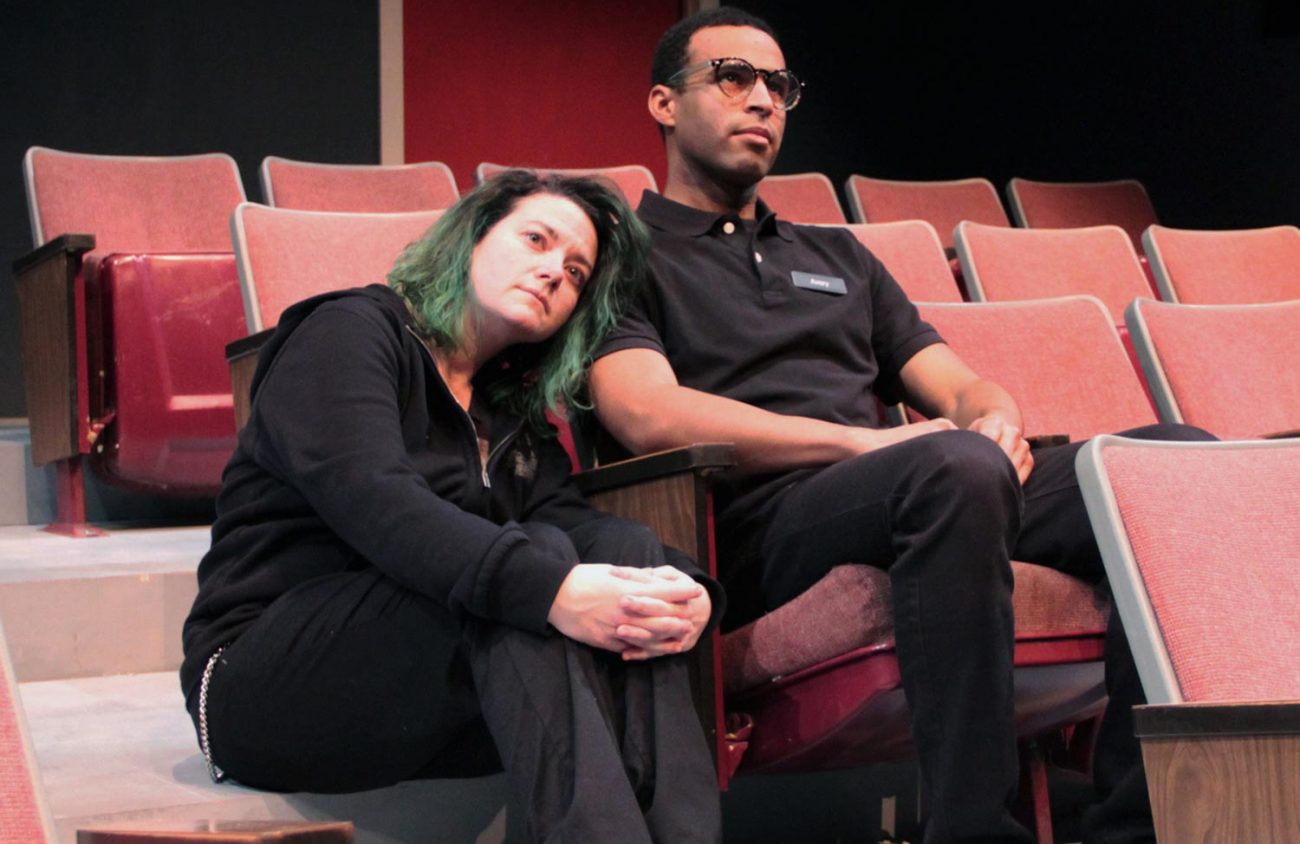Annie Baker landed the 2014 Pulitzer Prize for The Flick, an odd and affecting play — part slacker melodrama, part dark comedy, part existential no-exit — that burrows into the hidden hopes and silent desperations of three lost souls biding their time as ushers at a failing movie theater in Worcester, Massachusetts.
It’s a well-deserved Pulitzer, indeed. The play is exquisitely written, combing the raw, cynical, trashy talk of the neo-working class with the spare poetic meter of American realism. Beneath the endless and often banal banter of three disenfranchised movie geeks, Baker locates a buried pathos that throbs with all the oversized anguish of tragedy.
In the end, The Flick, on its surface a play about forsaken people doomed to service-industry work, carries the force of revelation, no more or no less than classic American dramas by grand masters such as Tennessee Williams and Sam Sheppard.
Oregon Contemporary Theatre’s current production of The Flick does utmost honor to Baker’s vision. Director John Schmor exhibits a tremendous level of trust in the work as well as in the audience, allowing an almost lackadaisical pacing that builds tension, even awe, in its very unhurriedness; witness the play’s opening scene, in which shuddering light and sound from a projected movie flicker for long minutes into an empty theater.
Such artistic patience is rare, especially in theater, but this production reveals uncommon faith in the fact that the audience will fall, slowly and surely, into its strangely punctuated rhythms — a mixture of workaday routine interrupted by cinematic bursts of emotion, sometimes hilarious, sometimes painful, often both at once. Tedium and anxiety collide, all in the unromantic shadows of Hollywood’s big-screen promises, and the results are no less surprising than anything projected on the big screen.
The really good news is that the small cast is more than up to the challenge of Baker’s language and the languorous subtlety of her plotting. Essentially, the play is a chamber piece for three characters: Sam (Scott Machado), the classic slacker, a dopey and passive but essentially goodhearted guy whose slouching posture speaks defiance and defeat in equal measure; Rose (Tara Wibrew) is bit of a prickly pear, a snarky, grungy girl whose authoritative air runs the gamut from playful to bitchy; and Avery (Jonathan Thompson), the younger black college kid with high artistic ambitions, revealed in his devout adherence to old-school celluloid film over digital, which he considers an abomination.
All three actors inhabit these roles exceptionally well, eking out the depths of feeling surging beneath the surface of workplace bullshit and routine broom-pushing. The performances are as gestural as they are word-driven; Machado, for instance, so fully embodies Sam’s fragmented, beleaguered sense of self, shrugging and moping his way through life while, sometimes, suddenly flaring into enthusiasm, that I thought several times, “Man, I know that guy!” He is me.
Anyone who’s worked in the weird, unnatural, masochistic realm of customer service understands that the relationships developing over time among human beings who serve human beings are fraught with danger: Is my co-worker my friend? What do we do with all this time together? Can I trust this person? Is she a fake? Is he a brown-noser? Are we going to fuck, or just fuck each other over?
The Flick takes on these questions with all the seriousness they deserve as timeless issues of being, and it does so with a realism that bestows a tattered dignity on people too often ignored by the banging grandiosity of the stage and screen. It meets its characters where they live — after the credits roll, in the aisles, sweeping up the popcorn we eat while we dream wide awake.
The Flick runs through Feb. 3 at Oregon Contemporary Theatre; tickets and times at 541-465-1506 or octheatre.org.
